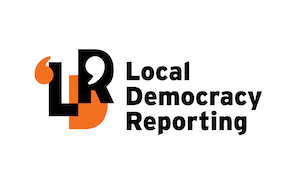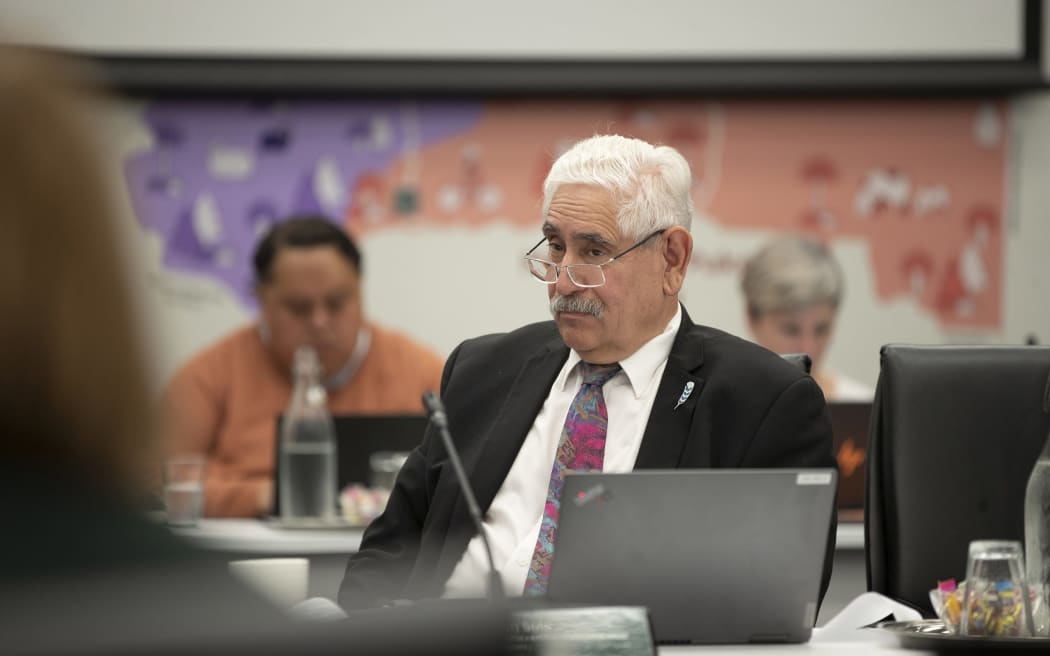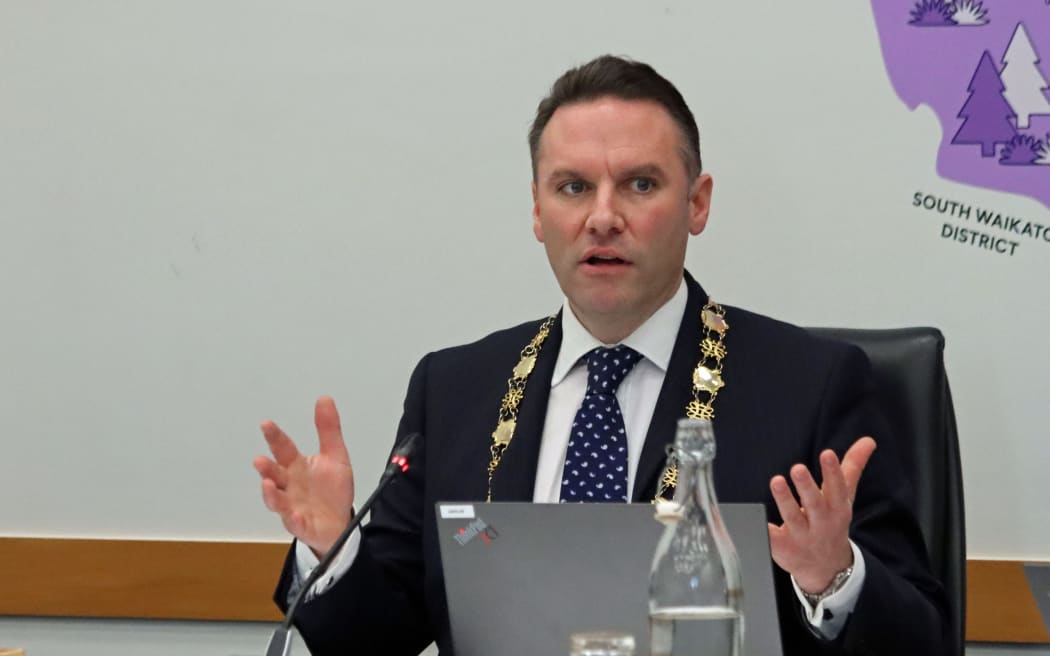By Alisha Evans for Te Ao Māori , Local Democracy Reporting
After a 12-year fight, mana whenua will get a seat at the table after the Western Bay of Plenty District Council has voted to establish Māori wards at the next election.
Applause then waiata rang out from the packed public gallery as the councillors voted nine to three in favour of Māori wards yesterday.
Speaking after the meeting, mayor James Denyer said it was a “momentous day, particularly for mana whenua”.

“This is about making the right decision, not making the popular decision.”
Mana whenua have long advocated for Māori wards in the district. In 2011 the council decided not to establish one and in 2017 the council opted to have a Māori ward, but it was subject to a poll requested by the public.
It was voted down in the poll with 78 percent of the respondents opposed. Just over 40 percent of eligible voters took part.
During the meeting’s public forum, Mabel Wharekawa-Burt said the poll was not an actual reflection of what the community was feeling.
‘Open your minds’
“My job today is to influence you to open your minds a little bit further, not to change your opinions,” she said.
Wharekawa-Burt, of Katikati, worked with the electoral commission for 14 years and urged the councillors to “take a chance”.
“We’re [Māori] not a threat. I’m bound and obligated to make good decisions for my grandchildren.
“Take a chance on me by unequivocally supporting the establishment of Māori wards and I’ll make sure you’re safe,” Wharekawa-Burt (Ngāi Te Rangi and Ngāti Ranginui) said.
Katikati — Waihī Beach Residents and Ratepayers Association chairperson Keith Hay opposed their establishment and said the decision affected all of the community and referred to the previous poll.
“To knowingly override these views without community consultation is arrogant.
“If you vote to introduce Māori wards today, voters’ views are being overwritten,” said Hay, in his opinion.
The council opted not to consult with the community because under the Local Electoral Act 2001 there were no obligations to consult with any person before passing a resolution to establish Māori wards.
‘Spectrum of community views’
WBOPDC strategic kaupapa Māori manager Chris Nepia’s report to council said: “Council already has a good understanding of the spectrum of community views on the establishment of Māori wards through previous processes.”
Tapuika Iwi Authority chief executive Andy Gowland-Douglas said it was “really important mana whenua were represented at the decision making table” and added “significant value”.
Former mayor Gary Webber, who was on the council for 12 years, said it was the third time he had been involved in the decision.
“It is time to do what is tika, what is right. Please don’t say no and be an outlier in the statistics.”
Deputy mayor John Scrimgeour moved the motion. He said it was a legislative requirement and important the council met this.
“Māori have continued to be entirely consistent in their request for Māori wards.
“They wanted to vote for someone that they could identify with and help them represent their interests.”
Not fairly represented
First term councillor Andy Wichers said he had heard from the community that Māori don’t feel they are fairly and effectively represented as individuals and as communities.
“The simple question was this, could Māori wards achieve a fairer and more effective representation? And the answer was yes, and I could not find an argument against it.”
Councillor Rodney Joyce said: “Partnership is deeply and rightly entrenched into our constitutional arrangements.
“Having guaranteed Māori members will help us be a better council.
“This is not a zero sum game where one treaty partner wins at the expense of the other. We can work together to make better decisions, bringing different perspectives.”
He did, however, want there to be consultation with the community.
“We should consult widely on this and seek to bring our community along with us in this decision.”
‘Incredibly rushed’
Tracey Coxhead said as a first time councillor she felt “incredibly rushed in this process” and “not informed enough” to make the right decision.
She too wanted community consultation.

Also opposed was councillor Allan Sole — he said he was part Māori but chose not to be on the Māori electoral roll.
“I believe that we have got to be people that look and work towards having a more harmonious whole community, not looking after factions.
He said, in his view, if people felt they were unequal he would “almost consider [it] patronising that somebody makes a special place for you”.
“I believe that to protect those special places is totally wrong and not beneficial to the decision making and future of our district and our country.”
Sole also questioned the Treaty of Waitangi: “We also ought to let the people look at it [the Treaty] and say perhaps . . . this actual document, a great piece of our history, may not be fit for purpose today.”
‘Same rights and privileges’
Kaimai ward councillor Margaret Murray-Benge said: “I believe strongly that, as the Treaty of Waitangi made clear that 180 years ago, all New Zealanders had the same rights and privileges.
“Creating racial division between us by creating racially separate based wards is fundamentally wrong.”
Councillor James Dally was visibly emotional as he spoke and referenced the 2021 decision by the local government minister to remove the ability for the public to request a poll on the creation of Māori wards.
He said the number of councils with Māori wards went from three to 34 and there were 66 councillors elected to represent Māori communities at last year’s local government elections.
“Hopefully in time the separatist or racist narrative will become a thing of the past.”
Denyer said: “It’s clear to me that Māori representation at council is deficient and it is no longer a radical or unknown option.”
He said Māori wards “work quite well” for the 35 councils that have them.

‘About honouring commitments’
Scrimgeour concluded: “I want to emphasise this is not about establishing a race-based constituency. It’s about honouring commitments that we made under the Treaty of Waitangi.”
Speaking after the meeting, Wharekawa-Burt said: “It felt glorious.
“I’m ecstatic for my grandchildren. I just wanted the right to make my own choice.”
Te Kāhui Mana o Tauranga Moana forum chairperson Reon Tuanau said it had been a long time coming and he had been involved since 2011.
Asked if he had any words for those that were fearful of Māori wards, Tuanau referred to the whakataukī.
“Nā to rourou, nā taku rourou, ka ora ai te tāngata. With your basket and my basket put into the same basket people will thrive.”
Western Bay of Plenty is the 36th council to establish Māori wards. Only those on the Māori electoral roll can vote in that ward.
How the Māori ward will be made up will be considered as part of the district representation review next year.
The review looks at what form the wards and community boards should take and how many elected members there should be, to best represent the district’s population. It will be subject to public consultation.
How they voted:
For: James Denyer, John Scrimgeour, Grant Dally, Anne Henry, Rodney Joyce, Murray Grainger, Andy Wichers, Richard Crawford, Don Thwaites.
Against: Margaret Murray-Benge, Allan Sole, Tracey Coxhead.
Alisha Evans is SunLive local democracy reporter. Local Democracy Reporting is Public Interest Journalism funded through NZ On Air. It is published by Asia Pacific Report in collaboration.
Article by AsiaPacificReport.nz






